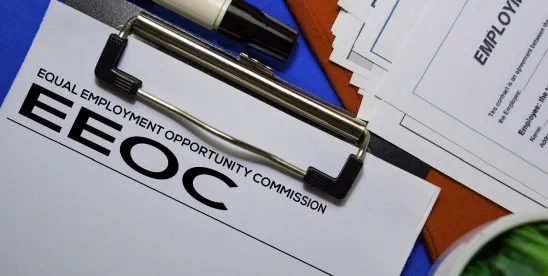Just months after issuing its final rule implementing the Pregnant Workers Fairness Act (PWFA), the U.S. Equal Employment Opportunity Commission (EEOC) has initiated multiple actions against employers for allegedly violating the PWFA.
Quick Hits
- The EEOC has initiated multiple lawsuits under the PWFA, highlighting its commitment to addressing pregnancy discrimination and ensuring employers provide reasonable accommodations for pregnant employees.
- The PWFA, effective since June 27, 2023, mandates that covered employers provide reasonable accommodations for pregnancy-related conditions.
Background on the PWFA
The PWFA, which President Joe Biden signed into law on December 29, 2022, and which took effect on June 27, 2023, requires covered employers to provide reasonable accommodations to workers for the known limitations of pregnancy, childbirth, and related medical conditions. On April 19, 2024, the EEOC published its final rule and interpretive guidance implementing the PWFA, which clarified the agency’s interpretation of “qualified” employees and reasonable accommodations. The final regulations took effect on June 18, 2024.
Lago Mar Settlement and Consent Decree
On September 30, 2024, following attempts to reach an administrative conciliation, the EEOC filed a lawsuit in the U.S. District Court for the Southern District of Florida, alleging violations of the PWFA and the Americans with Disabilities Act (ADA).
In the lawsuit, the EEOC alleged the employer had failed to accommodate an employee who experienced a stillbirth. The employee had sent the employer a doctor’s note stating that she could not return to work for “approximately six (6) weeks to recuperate and to grieve.” However, a day after receiving the note, the employer terminated the employee’s employment without engaging in the interactive process.
The EEOC and the employer agreed to settle the suit through a consent decree, which was filed with the court on October 1, 2024, and approved on October 11, 2024. Under the consent decree, the employer agreed to
- pay $92,080 in compensatory, non-wage damages and $7,920 damages in back pay;
- “not terminate or harass any employee on the basis of their pregnancy and/or disability”;
- “provide reasonable accommodations to applicants’ and employees’ known limitations related to pregnancy, childbirth, or related medical condition, unless the [employer] can demonstrate that the accommodation will cause an undue hardship on the operation of the [employer’s] business”;
- appoint a third-party equal employment opportunity (EEO) coordinator;
- review its employment policies and practices within ninety days in consultation with the EEO coordinator; and
- undertake certain training, recordkeeping, monitoring, and notice requirements.
The Lago Mar settlement is the latest development in a series of enforcement actions filed by the EEOC in September 2024. These actions target employers for violations of the PWFA, including the failure to provide reasonable accommodations, such as breaks and excused absences, or the continuation of policies that allegedly punish or disadvantage workers who are pregnant or facing other pregnancy-related conditions.
Here is a breakdown of some of the EEOC’s other recent PWFA enforcement actions.
Other PWFA Enforcement Actions
1. EEOC v. Kurt Bluemel, Inc.
On September 30, 2024, the EEOC filed a lawsuit in the U.S. District Court for the District of Maryland, alleging that a wholesale plant nursery had failed to provide reasonable accommodations to a pregnant employee in violation of the PWFA and Title VII of the Civil Rights Act of 1964.
According to the lawsuit’s allegations, the employee had worked for the employer since 2017 and become pregnant in the spring of 2023. The suit alleged that because of her pregnancy, she eventually could no longer perform the duties, which included “moving potted plants and preparing plants to be loaded onto trucks.” Specifically, the suit alleged that “because of her pregnancy, she was experiencing fatigue, dizziness[,] and headaches while performing manual labor.”
She requested leave “due to her pregnancy-related physical inability to perform manual labor, for childbirth, and for anticipated recovery from childbirth” from August 2023 until January 2024. According to the lawsuit’s allegations, she invited the employer to provide feedback on the return date, but the employer did not respond or engage in the interactive process. She “stopped working” in September 2023 and gave birth weeks later. In December 2023, she tried to return to work, but the employer “told her that no work was available” before hiring additional laborers, the suit alleged.
The suit seeks an order requiring the employer to implement nondiscriminatory practices and policies and award damages to make the worker whole for past and future pecuniary losses, emotional distress, and punitive damages.
2. EEOC v. Polaris Industries, Inc.
On September 25, 2024, the EEOC filed suit in the U.S. District Court for the Northern District of Alabama against a manufacturer, alleging claims under the PWFA for failure to provide a reasonable accommodation and constructive discharge. The suit alleges that a new employee at an assembly facility, who notified the employer at the new employee orientation that she was pregnant, was not excused for absences due to her pregnancy-related conditions and medical appointments and was required to work overtime despite medical orders not to work more than forty hours per week.
According to the suit, the employee developed “pregnancy-related conditions such as nausea, swelling in her feet, aching joints, and suspected gestational disabilities which also required her to be temporarily absent from work.” Because she was not eligible to accrue paid time off until after a sixty-day probationary period, the employer allegedly “assessed attendance points against [the employee] for absences necessitated by her pregnancy-related medical conditions and medical appointments.” The employee eventually resigned to avoid being discharged.
The suit further alleged that the employer denied the employee’s temporary accommodation request not to work overtime despite a note from her doctor stating that she needed to be restricted to work a maximum of forty hours per week. According to the suit, the employer denied the request, and a human resources manager informed the employee that “overtime is an essential function of the position.”
3. EEOC v. Urologic Specialists of Oklahoma, Inc.
On the same day as the Polaris case, the EEOC filed a separate lawsuit in the U.S. District Court for the Northern District of Oklahoma, alleging that a specialty medical practice had refused to provide reasonable accommodations to a medical assistant dealing with a high-risk pregnancy, forced her to take unpaid leave, refused to provide lactation breaks after the birth of her child, and had eventually terminated her employment.
According to the complaint, medical assistant jobs with the employer typically required standing for most of the workday, and medical assistants were not guaranteed full thirty-minute meal breaks. The suit alleged that the employer denied requests by the pregnant medical assistant, who was “experiencing substantial swelling, pain, and discomfort in her feet, legs, and abdomen,” and who was eventually diagnosed with “placental insufficiency,” to sit more and take meal breaks in line with doctors, even though her doctor had ordered that she only do light duty work. Eventually, she was placed on unpaid leave.
The lawsuit alleges that after the medical assistant gave birth, the employer would not guarantee her the ability to take breaks for meals and to express breastmilk. According to the suit, she refused to return to work without those guarantees, and the employer discharged her.
The EEOC alleges that the employer failed to provide reasonable accommodations in violation of the PWFA and the ADA and “acted with malice or with reckless indifference to [the employee’s] federally protected rights.”
4. EEOC v. ABC Pest Control, Inc.
On September 11, 2024, the EEOC announced that it had entered into a conciliation agreement with a Florida pest control company to settle a pregnancy accommodation charge. The EEOC had alleged the company unlawfully discharged a pregnant employee after the employee requested an accommodation to attend monthly medical appointments. As part of the settlement, the company agreed to pay the employee nearly $50,000 in damages, provide training to its employees, make quarterly reports, revise its policies, and appoint a new EEO coordinator.
Key Takeaways
While most of the EEOC’s recent enforcement actions remain in the early stages of litigation, the allegations provide a glimpse into the EEOC’s interpretation of the PWFA and potential employer actions that the agency will seek to stop. In particular, the actions demonstrate that the EEOC will hold accountable employers who place pregnant employees on unpaid leave if reasonable accommodations are available. The actions also highlight the importance of employers engaging in the interactive process to determine which accommodations are reasonable. The actions tend to call into question employer practices that punish employees for unexcused absences or missed time (including to attend medical appointments) that is due to pregnancy, childbirth, or related medical conditions.
Further, the Lago Mar settlement and the ABC Pest Control conciliation highlight that the agency will seek monetary compensatory damages and back pay against employers for PWFA violations, in addition to the imposition of specific PWFA compliance requirements and the appointment of an EEO coordinator.
Employers may want to review their policies and procedures for providing and granting workplace accommodations to account for the new worker protections for pregnancy and the known limitations of pregnancy, childbirth, and related medical conditions. Employers may also want to consider training human resources professionals and managers on protections under PWFA





 />i
/>i
